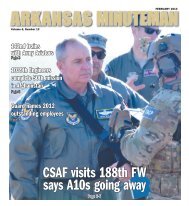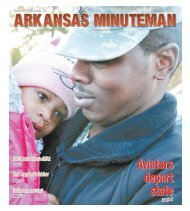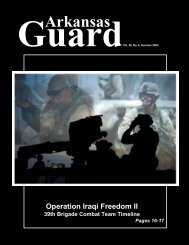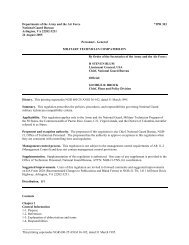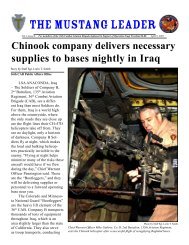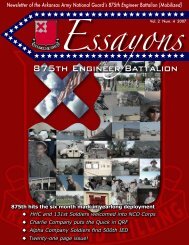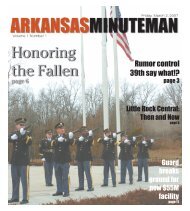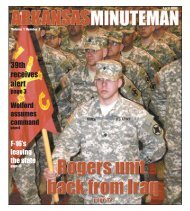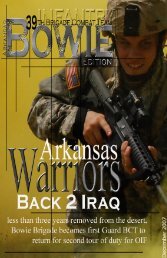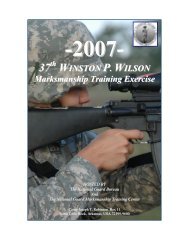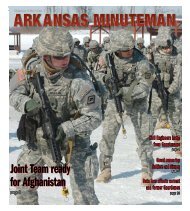Fighting New Battles - Arkansas National Guard
Fighting New Battles - Arkansas National Guard
Fighting New Battles - Arkansas National Guard
You also want an ePaper? Increase the reach of your titles
YUMPU automatically turns print PDFs into web optimized ePapers that Google loves.
The <strong>Arkansas</strong> Minutemancover storyPTSD and stressGetting help is the first stepCompiled from <strong>National</strong> Center for PTSDfact sheets and on-line informationRelationship problems, troublesat work or with finances and disruptedsleep are just some of the signs ofcombat stress.During deployment Soldiers and Airmen may have taken partin missions and operations that exposed their military unit tostressful or life threatening experiences. They may have beenshot at, seen the death or injury of civilian and enemy combatants,or even witnessed the death or injury of friends and fellow<strong>Guard</strong> members. The statistics are startling.According to research conducted by the <strong>National</strong> Center forPTSD (Post Traumatic Stress Disorder), an agency of the VeteransAdministration, 89% of Army troops in Iraq report beingattacked or ambushed, 86% have received incoming fire, 93%have been shot at, 95% say that they have seen dead bodies orremains and 86% know someone who has been seriously injuredor killed.The VA, Department of Defense and the <strong>National</strong> <strong>Guard</strong>Bureau have gone to great lengths to understand how theseexperiences affect our troops, and what can be done to identifyand treat those who experience the unwanted side affects of theharshness of war.Combat Stress ReactionService members respond to traumatic situations in differentways. Some report feeling upset or “keyed up,” even afterthey return home. They may continue to think about events thatoccurred in combat, sometimes even acting as if they were backin a combat situation.These “combat stress reactions” (also called acute stressreactions) can last for days or weeks and are a normal reaction tocombat experiences. Most recover naturally, but others continueto struggle with the memories of their combat experiences andtheir reactions to it.Relationship problems, troubles at work or with finances anddisrupted sleep are just some of the signs of combat stress. If theSoldier or Airman continues to experience these reactions, and itbegins to cause problems for the family or at work, the conditionmay indicate a prolonged combat stress reaction known as PTSD.What is Post Traumatic Stress Disorder?PTSD is psychiatric disorder that can occur following theexperience or witnessing of life-threatening events such asmilitary combat, natural disasters, terrorist incidents, serious accidents,or violent person assault like rape.PTSD is marked by clear biological changes as well aspsychological symptoms. PTSD is complicated by the fact thatit frequently occurs in conjunction with related disorders such asdepression, substance abuse, problems of memory and cognitionand other problems of physical and mental health. It is associatedwith impairment of a person’s ability to function in social orfamily life, including occupational instability, marital problemsand divorces, family discord and difficulties in parenting.Understanding PTSDPTSD is not new. There are written accounts that go backPage 30 Summer Fall 2005 2006



